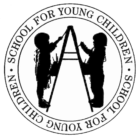Kids change and grow quickly, most noticeably when they’re really little. When a child enters SYC at two years old and leaves at three, they’ve been here for a fourth of their life, and in that time may have learned to use the toilet, put their coat and shoes on, speak in more complex sentences, remember things from months ago, follow a 2- or 3-step direction, and (sometimes) restrain the urge to smack someone who takes something they’re using.
As adults, hopefully we grow and change from year to year as well, though often in more subtle ways: new habits, new ideas, new perspective. Outside events – sometimes desirable sometimes not – may happen that prompt change but we sometimes have to be intentional if we want to grow.
At SYC, we are intentional about growth for adults as well as children. We offer parent education and parent coffees to give families an opportunity to learn from and with each other. And teachers are always available to answer your questions or act as a sounding board.
As early childhood professionals, SYC teachers have a variety of opportunities for learning and growth. Sometimes we invite experts to help us address something we’re curious about or struggling with. This year, SYC parent and early childhood mental health specialist Erin Tebben talked with us about trauma, its effects on children, and how we can help children build new neural pathways. We’ve also been working with another early childhood mental health specialist from Nationwide Children’s Hospital who has helped us be more intentional about interventions we use with children who are struggling.
Here at SYC, we have a wealth of knowledge within our walls and learn from each other all the time. Teaching teams meet daily to share observations, questions and challenges. All the teachers get together monthly, sometimes to learn about a specific topic such as a reflective practice.
Most years we take a trip together in the spring as part of our professional development. We may attend a conference, arrange for a workshop by someone we admire, or visit an early childhood program. All of these experiences have inspired growth: we might refine who/what we are or what we do, or the experience might help us define who/what we are not or what we do not do. Both are valuable and fuel conversations and reflection for months or sometimes years. Whether the visits and conversations encourage us to make changes or to hold more firmly to what we don’t want to change, they encourage us to remember the why of SYC and help us to better articulate who we are.
On March 2, the SYC teachers visited St. Mark’s Nursery School in Bloomington, IN as our spring professional development. Their director, Sierra, was kind enough to answer an online plea for a play-based preschool program within an eight-hour drive of Columbus who would be open for a visit, and to welcome our teachers into their program for a morning. After researching more about their school, we noticed how much the two programs have in common: both started in 1969, both outreach programs, both around 140 students, both 2.5 hrs a few days a week.
When we visited, though, we were surprised at how eerily similar the programs are. We heard teachers say things like, “You said ‘stop’ and you said ‘stop’ but you’re both smiling. Do you still like it?” and “What’s your plan?” and “You can ask her if you can use it.” It’s like they’d read the back of our t-shirts! We saw teachers treating children’s needs and bodies with respect, saying things like, “It looks like your body needs to move.” We saw kids engaged in free play: using materials how they chose, playing with whoever they chose, for as long as they chose.
In this way, our circle of like-minded professionals has grown and we are confident it will lead to further conversations and visits. Our trip was also an affirmation that the SYC approach not only works here in our specific context, but in other environments as well.
Equally important, the trip allowed teachers time together away from our busy lives with families, other jobs, and a life outside of SYC. Just as it’s essential for children to have time for uninterrupted play to learn who they are in the world and in relation to others, it is essential for adults to have uninterrupted time whether it’s playing, eating, or long talks on car ride or late into the night. Like children, we too need time to clarify who we are in the world and in relation to others. This time for reflection and for learning more about the people we work with rejuvenates and refreshes us, allowing us to come back to the classroom with our cups full, ready to be there for the children.
We know that time alone or with other adults can be in short supply when your children are young! Nevertheless, we hope that you find time – where and when you can – to think about how you’d like to grow alongside your child.
-Susan Roscigno and Amy Rudawsky, SYC Co-Directors
